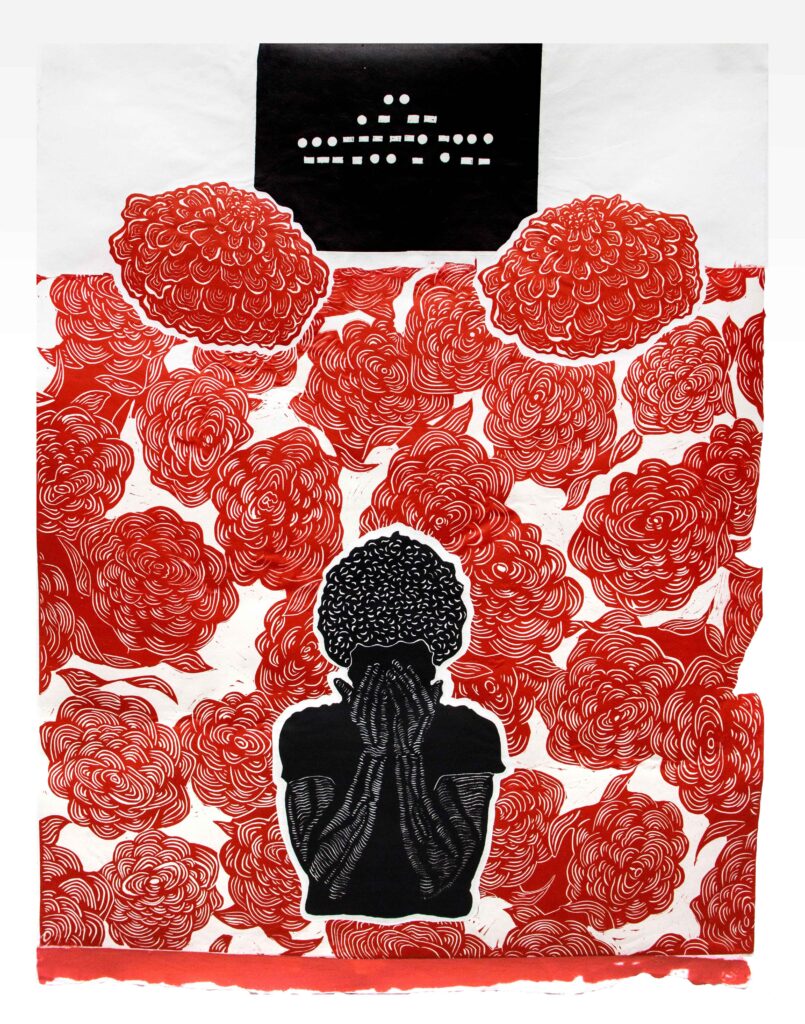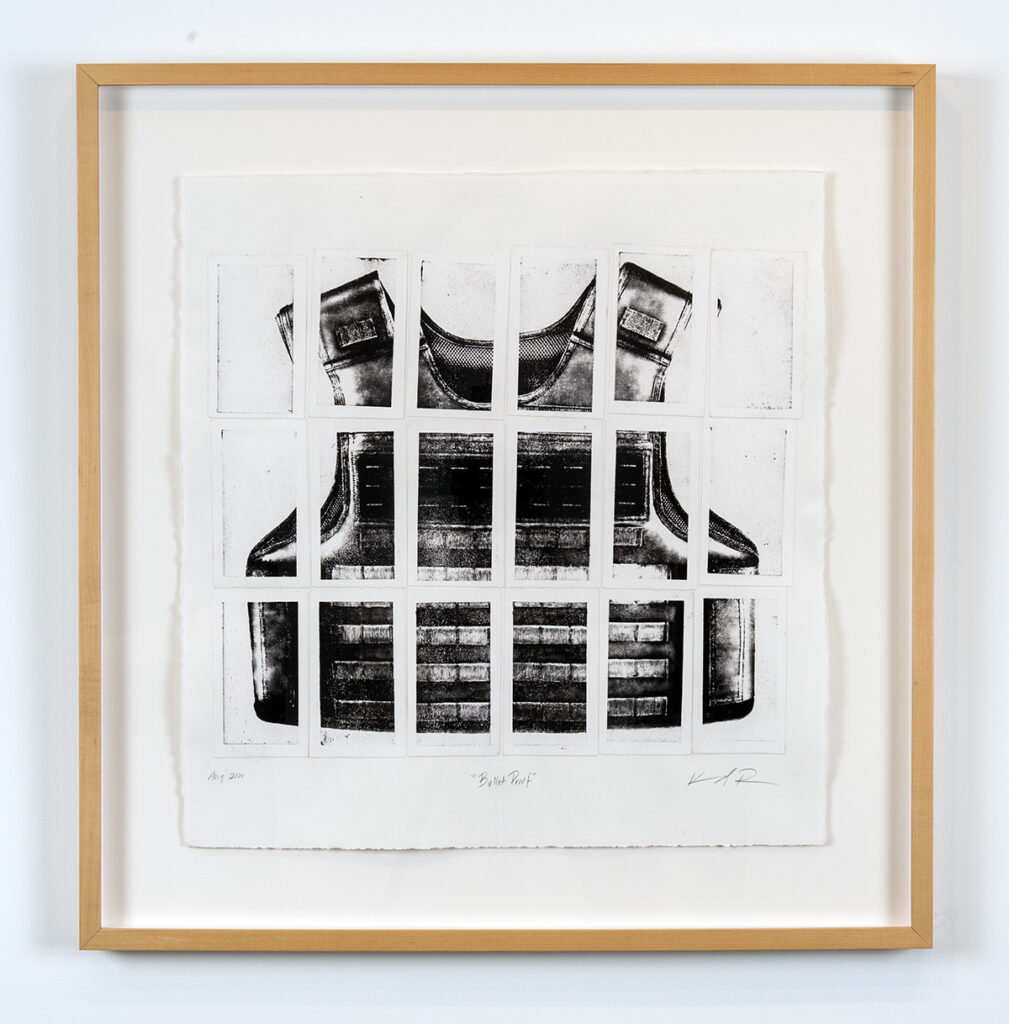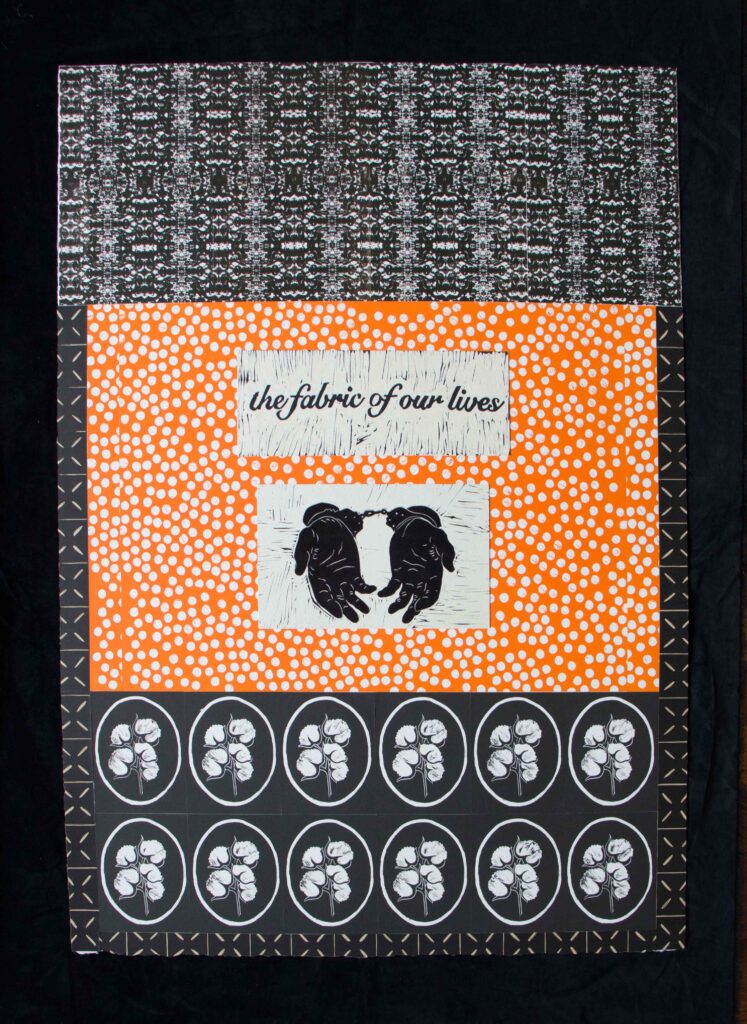Table of Contents
- Oil Paintings by Kiarra Elliott
- Take Charge of Education and Bring Back the Arts!
- Figurative Paintings by Aaron Marner
- Acrylic Artwork by Ki Nichole
- DECEMBER 21ST by John Bias
- “The Sterling Studies” by Sterling Jr.
- Meet Rand White
- Looking to the Future
- Meet Bryant Small
- “Black Star” by Ashante Ford
- Printmaking with Karen Revis
- Abstract Paintings by Cedric M. Cox
- “give love words because bell hooks said so” by Niina Taapopi
- Meet Allen Collins
- Textile Art by Simone Saunders
- Meet Roosevelt Taylor
- THERE’S A TIME 2 LAUGH by Monalisa
- A New Experience in Black Art: The Black Art Expo
- Abstract Paintings by QRCKY
- Meet Mbuyisa Maphalala
Interview with Karen Revis

Karen Revis, 2020 (I AM SOMEBODY - Morse Code), 2021, Linocut on Handmade Paper
Karen J. Revis is an artist based in New York City who is driven by process and materials. She is a printmaker using a variety of techniques including monotypes, lithographs, etchings, linoleum cuts, collagraphs, and papermaking. Her Karen J. Revis Studio portfolio comprises abstract monotypes, vibrant with color and texture. Revis’ monotypes have been used to create textile designs. She has partnered with Brooklinen to create a beautiful line of bedding, A-Street Prints to create a stunning line of wallpaper, and she created a limited edition of prints for Room and Board.
In 2017 she started Revisionary Prints, which was created to explore her experience growing up in an all Black community in the 60’s and being Black while existing in today’s political climate. Two of Revis’ prints were selected by Colossal Media as the first in their Represent: Black Arts mural project, with murals in NYC and LA.
Revis was a recipient of the Robert Blackburn Workshop SIP Fellowship in 2018. She has attended residencies at The Morgan Paper Conservatory, Cleveland, OH; BACAS, Teggiano Italy; Pyramid Atlantic, Silver Spring MD; The Women’s Studio Workshop, Rosendale NY and Henry Street Settlement, NY, NY.
Her work is featured in The Art of Encaustic Painting: Contemporary Expression in the Ancient Medium by Joanne Mattera (Watson-Guptill Publications). In 1995 she received a B.F.A. from Pratt Institute in Brooklyn, NY. She served as a Board Member 2018 – 2021 Women’s Studio Workshop, Rosendale, NY board member of the Women’s Studio Workshop, and continues to collaborate and exhibit her work widely.
 Karen Revis, Sankofa Self Portrait, 2021, Linocut
Karen Revis, Sankofa Self Portrait, 2021, Linocut
REVISionary Prints is a project I started as a conversation about my experience growing up in a Black community. I have a very particular view of the world as a Black American woman born in the early 60’s. When I was two years old, I held my mother’s leg as she cried when Kennedy was shot. I was five years old when Malcolm X died and Martin Luther King Jr. died when I was seven. My parents and my community lost their leaders. These men weren’t icons then. They didn’t have holidays or avenues. They were real people on the ground fighting for and in our communities. I grew up in the era of Black Power and the Rainbow Coalition, which was a precursor to Black Lives Matter. I use existing images in the media as raw material to tell the story of my childhood and my heroes. I am celebrating and defending my community through my art.
Read our interview below to get a glimpse into Karen Revis’ printmaking journey.
How did you get into printmaking? How has your practice changed over time?
My introduction to printmaking was during my studies at Pratt. I went to art school to become a painter. I took a printmaking class as an elective and I really struggled with it. I took lithography which is very technical and I didn’t love the process. It felt rigid and scientific. At that time, I preferred a process that was more immediate and playful. Not long after graduating college, I experimented with monotypes. This technique is very fluid and fast. I loved the immediacy of making monotypes, the technical part didn’t get in the way, and I was able to make rich color combinations that I found exciting! I worked solely making abstract monotypes composed of washes of colors for years.
In 2019, I got a printmaking fellowship at the Robert Blackburn Workshop and that changed everything. The fellowship introduced me to a number of different printmaking techniques that I had never tried. The fellowship expanded my printmaking vocabulary. I began to really think about my work differently. I felt like I now had the tools to really say something with my art, and so many options to express myself. It also opened up the idea of working with master printmakers. Master printmakers are called masters for a reason, they deal with the technical aspects which frees the artist up to be creative. I love the collaboration.
 Karen Revis, Bullet Proof Vest, 2020, Paper Lithograph
Karen Revis, Bullet Proof Vest, 2020, Paper Lithograph
This issue’s theme is Abstraction of Expression. Can you tell us about your abstract work?
For me, abstraction is a broad term. Even though my work contains figurative elements, Black men and women, hands, cotton, etc., they are stylized and abstracted versions of themselves. These figurative elements are collaged with abstract elements of marks, texture, and color. I often create backgrounds with repetitive patterns that are sometimes symbols that tell the story of the work. Because of the abstract nature of my work, it lends itself to different interpretations.
You make art that addresses the Black history. What impact does art of this subject have?
“A picture is worth a thousand words.” Emotions can be communicated in such an honest way through art. Individual expressions of the human condition will always find an audience that relates because we are all connected. My art is a celebration of my culture and family. The themes in my work touch on Black pop culture and Black history. I use my art to tell my story my way and the beauty of art is that it’s accessible to everyone, regardless of age, race, faith, or economic status.
I have had the honor to present my work in various academic settings, from universities to grade schools, and the conversations have all been lively and thought-provoking. Teachers recognize art as an effective teaching tool. Art is so immediate and, believe it or not, you don’t need a particular skill to understand it. The artist’s message can be conveyed even if you don’t like the artwork. I can honestly say I have never met a person who didn’t like art.
Through BAM we hope to inspire the next generation of creative entrepreneurs to tackle challenges we face as a community. What do you feel is missing within our Black art communities?
I would love to see more diversity within competitive art residences and in academia. I would love to see young Black art students have the opportunity to express themselves in a way that is authentically Black and original without the approval or validation of a European-influenced audience. Buying art and visiting galleries and museums in this country has historically been something for the elite. I can see this changing, but I want us to see that art celebrating our culture and telling the story of our history is valued, especially when it’s art by us and for us. We must understand that collecting the art of Black artists is an investment in ourselves and our legacy.
 Karen Revis, Blue Face Orange Circles, 2020, Mixed Media on Handmade Paper
Karen Revis, Blue Face Orange Circles, 2020, Mixed Media on Handmade Paper
How do you seek out opportunities? How have you developed your career?
I’ve been an artist for more than 30 years and it has been challenging. No one in my family before me pursued a career as a fine artist. It’s a strange career path because you can get a degree (and pay handsomely for it) and then find yourself on the street with your degree because there’s no clear path to take. Going to an art school did give me exposure to resources that help develop an art career.
Even now, I spend a lot of time researching and applying for residencies, grants, and fellowships that provide time, space, and funding to create. I use a variety of resources like the New York Foundation for the Arts (NYFA) which provides a list of ongoing opportunities for artists. This is a tool every artist should be aware of and take advantage of.
For years I thought the only sign of being a successful artist was to have a gallery. Galleries can be very difficult to get into and finding the right gallery and artist relationship can be challenging. However, I have found that becoming a member of a collective can be very rewarding. Finding a community of artists is important and social media has made it much easier to connect to other artists, buyers, and institutions interested in promoting art.
What types of art and culture do you like to consume? Who or what are your most important artistic influences?
My influences change depending on what I am interested in at the time and I often find inspiration in the most unlikely places. I recently saw “Inspiring Walt Disney: The Animation of French Decorative Arts” at the Metropolitan Museum and it blew me away. I realized that my color palate is influenced by Disney. Right now, I am heavily into all things hip-hop. I’m listening to rap and old-school R&B in my studio. I’m also a big fan of Revolt TV, mainly Drinking with Champs. I create a lot of work while listening to Nori!
How do you define success as an artist? What do you wish to accomplish?
Being a professional artist means you are a small business owner. If you enjoy making art and pursue it as a hobby, that’s great! If making art is something you’d like to do for a living you have to make enough money to sustain your practice and your lifestyle. A successful artist is an artist who makes money! My goal is to be a practicing artist for as long as I desire. I would also like to bring a new audience to the art game. I’d like to inspire new Black art collectors and I’d like to show young, passionate Black artists that it’s possible to make art a career.
 Karen Revis, Cotton: The Fabric of Our Lives, 2022, Collage: Linocut, Silkscreen, and Pronto Plate
Karen Revis, Cotton: The Fabric of Our Lives, 2022, Collage: Linocut, Silkscreen, and Pronto Plate
What are you besides an artist?
In addition to making art, I also work with adult artists with learning disabilities. I lost my job two years ago when Covid hit, and I am just going back now. I love working with these artists and I am constantly being pushed to be as authentic as they are.
What’s the best piece of advice you’ve been given?
I 100% believe in a quote by Colin Powell: “There are no secrets to success. It is the result of preparation, hard work, and learning from failure.”
The advice no one told me that I would give a artist starting out: Understand being a professional artist means you are running a small business so acquire the skills that it take to run a business successfully.